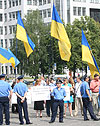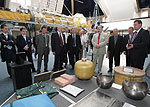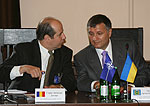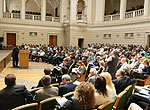NATO ambassadors visit regions in Ukraine

Pro-NATO demonstration
© UKRINFORM
Public diplomacy was an integral part of the North Atlantic Council’s visit to Ukraine. Following the first day of their trip in Kyiv, NATO ambassadors accepted the Ukrainian invitation to split into three groups to visit the cities of Dnipropetrovsk, Kharkiv and Lviv, where they participated in activities jointly organized by local authorities, non-governmental organizations and the NATO Information and Documentation Center.

Anti-NATO demonstration
© UKRINFORM
In each city, the senior diplomats were given the opportunity to engage with local officials, members of the civil society, students and journalists. Their main priority was to listen to people’s opinions and concerns about their country’s drive towards greater Euro-Atlantic integration and possible NATO membership. The ambassadors sought to counter the myths and stereotypes that still exist about NATO and its influence on Ukraine’s regional security. Underlining the collective security role of NATO, some explained why their own countries are members of the Alliance and what impact joining NATO has had.
The visits to the regions were also an excellent opportunity to highlight concrete projects developed by NATO and individual Allies in and with Ukraine. These include two Partnership for Peace Trust Fund projects – one for the retraining of former military personnel and the other for the destruction of stockpiles of small arms and light weapons. Cooperation under NATO’s Science for Peace and Security (SPS) programme is also a priority for Ukraine and particularly relevant in Dnipropetrovsk and Kharkiv, two cities well-reputed for their scientific capabilities, in particular linked to the defence industry.
The ambassadors’ visits generated a lot of interest in Ukraine and were given considerable coverage in the national and regional media, in particular television. Both pro- and anti-NATO demonstrations took place – a sign of “democracy in action”, commented NATO Secretary General Jaap de Hoop Scheffer.
Dnipropetrovsk

NATO ambassadors visit the National Aerospace Educational Center in Dnipropetrovsk
© UKRINFORM
The NATO ambassadors of the Czech Republic, Denmark, Lithuania, Slovakia and the United Kingdom as well as representatives of Hungary and Italy visited Dnipropetrovsk. The city’s mayor and high-level representatives of the regional administration explained tendencies and challenges within the region which has several million inhabitants. The region is one of the core industrial and technological nodes of the country and produces satellite launchers in collaboration with companies from NATO countries.
Ambassadors attended a meeting organised by the Centre for Euro Atlantic Integration, which was recently opened with the support of the Czech government. They then moved on to the National Aerospace Educational Center, where they engaged in an intensive dialogue with about two hundred students from various educational establishments, engineers from defence factories and young political activists.
Kharkiv

The Romanian ambassador to NATO chats with regional governor, Arseniy Avakov, in Kharkiv
© UKRINFORM
In Kharkiv, the NATO ambassadors of Estonia, Germany, Iceland, Norway, Portugal and Romania as well as representatives of Spain and the United States met the regional governor, Arseniy Avakov, over breakfast. They then took part in a round-table discussion at the Kazarin National University of Kharkiv.
They also paid a visit to the Single Crystal Institute, where they were briefed on scientific collaboration being supported by the NATO SPS programme. (see separate story).
Lviv

NATO ambassadors engage with students at a seminar at the Ivan Franko National University in Lviv
© UKRINFORM
NATO ambassadors from Belgium, Canada, France, Greece, Latvia, the Netherlands, Poland, Slovenia and Turkey as well as a representative of Luxembourg visited Lviv. At a seminar organized by the Institute for Society Transformation at the Ivan Franko National University, the ambassadors answered many questions relating to the NATO-Ukraine relationship. Afterwards, students of the Polytechnic University and cadets from the Sahaydachny Military Institute were also given the opportunity to be informed on NATO from prime sources.




